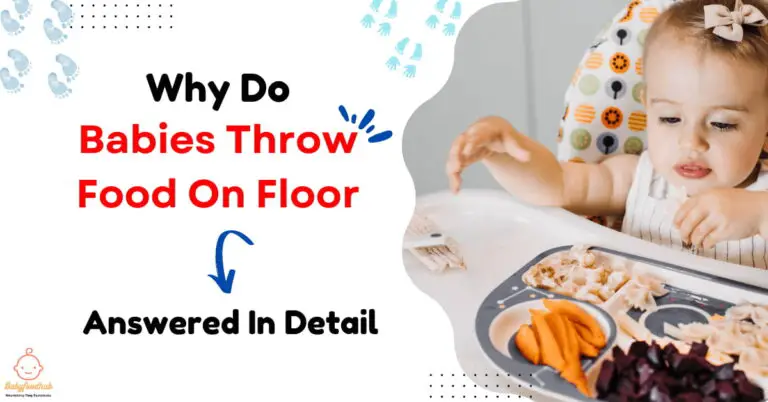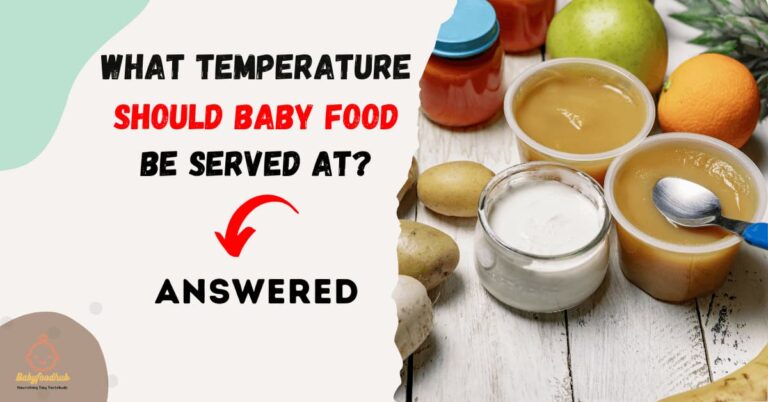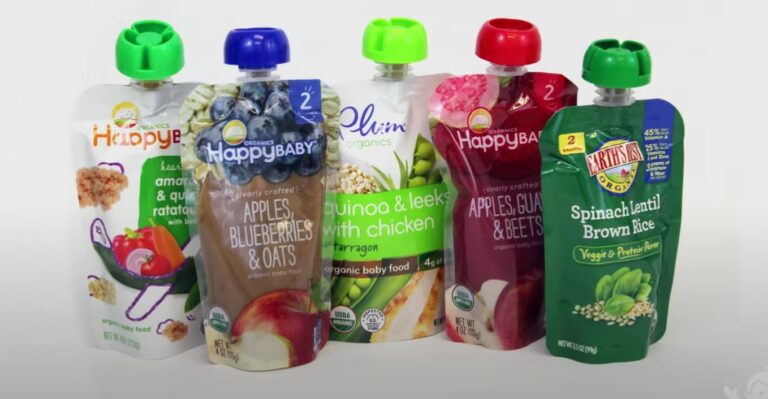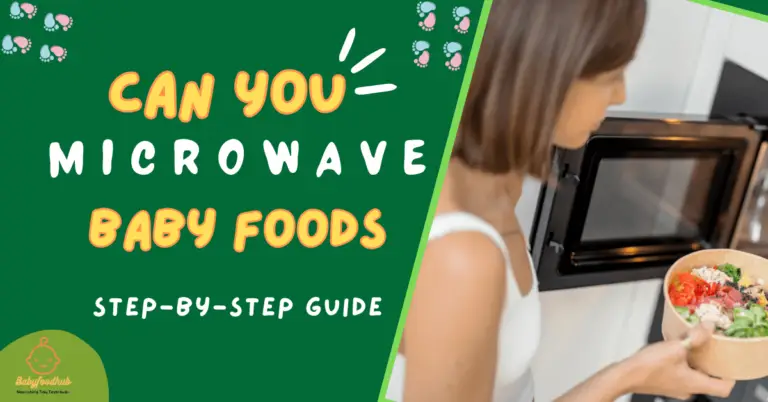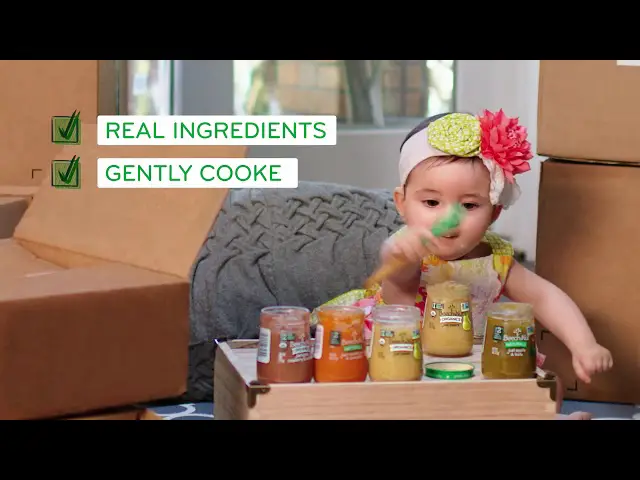How to Know if Baby Has Food Allergy | Quick Tips

Discovering the world through tiny bites is a fascinating adventure for babies. But what if the new food makes our little explorer’s tummy upset or causes a rash? Just like how some people can’t be around cats without sneezing, some babies might have a hard time with certain foods. This is what grown-ups call a food allergy. It’s when the body acts like a food invader is attacking and tries to fight back. Food allergies in babies are a concern that many parents have, as they start introducing their little ones to different types of foods. This blog aims to become your friendly guide in understanding how to spot if a certain food isn’t agreeing with your baby, and what steps to take to keep your baby safe and happy. Through this gentle guide, we will learn together how to notice if a food is causing an allergy for your baby, and what to do to help. So, as you embark on this exciting food journey with your baby, let’s arm ourselves with some handy knowledge to make it a smooth and joyful ride.
To know if a baby has a food allergy, look for symptoms like rashes, vomiting, diarrhea, or difficulty breathing, and consult a pediatrician for a proper diagnosis and treatment. Discovering a food allergy in your baby can be a worrisome and confusing experience for parents.
Understanding Food Allergies In Babies

Babies are delicate beings with developing immune systems, making them more susceptible to various allergies. Food allergies, in particular, can cause discomfort and distress in infants. As a parent, it is important to be aware of the signs and symptoms of food allergies to ensure your baby’s well-being. In this section, we will delve deeper into the topic of food allergies in babies, covering what they are, the different types, common food allergens for infants, and the prevalence of such allergies in this age group.
Different Types Of Food Allergies
Food allergies can be classified into various types based on the body’s response. The most common types of food allergies in babies include:
- IgE-mediated allergies: These allergies occur when the body produces immunoglobulin E antibodies in response to specific proteins in food. Symptoms can range from mild to severe and can include hives, itching, swelling, vomiting, diarrhea, and difficulty breathing.
- Non-IgE-mediated allergies: These allergies do not involve the production of immunoglobulin E antibodies. Instead, they cause delayed allergic reactions, often affecting the digestive system and causing symptoms such as vomiting, diarrhea, and stomach cramps.
Common Food Allergens For Babies
While any food can potentially trigger an allergic reaction, certain foods are more commonly associated with allergies in infants. These include:
- Cow’s milk
- Eggs
- Wheat
- Soy
- Tree nuts
- Shellfish
- Fish
Prevalence Of Food Allergies In Infants
Food allergies affect a significant number of infants, with prevalence varying across regions and populations. Studies suggest that up to 8% of children below the age of 3 in Western countries may have food allergies, and this number has been increasing in recent decades. Therefore, parents must stay vigilant and be able to recognize the signs of food allergies in their babies to provide the necessary support and medical attention.
Identifying Symptoms Of Food Allergy
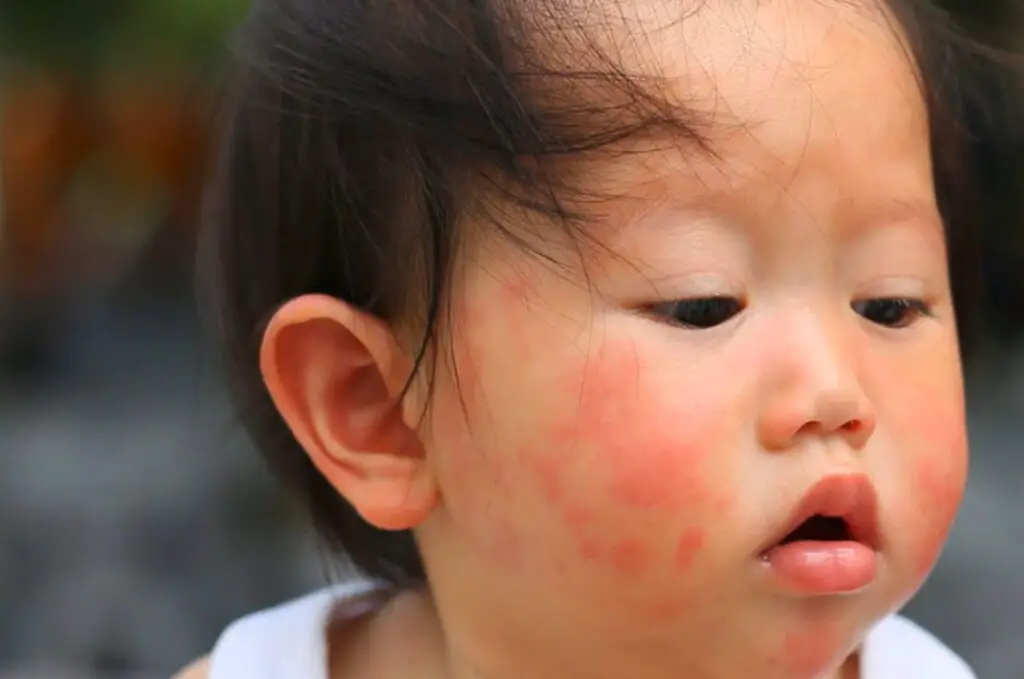
When it comes to identifying symptoms of food allergy in babies, it is important to be vigilant for signs such as rashes, vomiting, diarrhea, and difficulty breathing. Pay close attention to any changes in your baby’s behavior after introducing new foods.
Identifying Symptoms of Food Allergy When it comes to identifying if your baby has a food allergy, it’s important to recognize the common symptoms that may appear. Food allergies can manifest in various ways in infants, and being aware of these symptoms can help you take necessary precautions and seek appropriate medical attention. In this section, we will discuss the different physical, skin, digestive, respiratory, and behavioral symptoms that can indicate a food allergy in your baby.
Physical Symptoms
One of the primary indicators of a food allergy in infants is the presence of physical symptoms. These symptoms can range from mild to severe. Some physical symptoms to watch for include:
- Swelling of the face, lips, tongue, or throat
- Hives or rash on the skin
- Itchy or watery eyes
- Coughing or wheezing
- Nasal congestion
Skin Reactions
Skin reactions are another common way that food allergies can manifest in babies. These reactions are usually visible shortly after the baby consumes the allergen. Look out for the following skin reactions:
- Rash or hives
- Redness or flushness of the skin
- Eczema or dry, itchy skin
- Skin swelling or puffiness
- Development of small, raised bumps
Digestive Issues
Digestive problems often occur when a baby has a food allergy. These issues can affect the gastrointestinal tract and may include:
- Vomiting or spitting up
- Diarrhea
- Abdominal pain or cramping
- Bloating or excessive gas
- Constipation
Respiratory Problems
Respiratory problems can also indicate a food allergy in infants. These symptoms usually involve the airways and can include:
- Coughing
- Wheezing or difficulty breathing
- Runny or stuffy nose
- Sneezing
Behavioral Symptoms
Changes in behavior can sometimes be a clue that your baby is experiencing a food allergy. Keep an eye out for the following behavioral symptoms:
- Irritability and fussiness
- Restlessness or difficulty settling
- Crying or screaming excessively
It’s important to note that symptoms of a food allergy can vary from baby to baby. If you suspect that your baby has a food allergy, it’s best to consult with a healthcare professional for a proper diagnosis and guidance on managing their allergy. Remember, early identification and appropriate management are key to keeping your baby safe and healthy.
Diagnostic Methods For Food Allergies And Intolerances
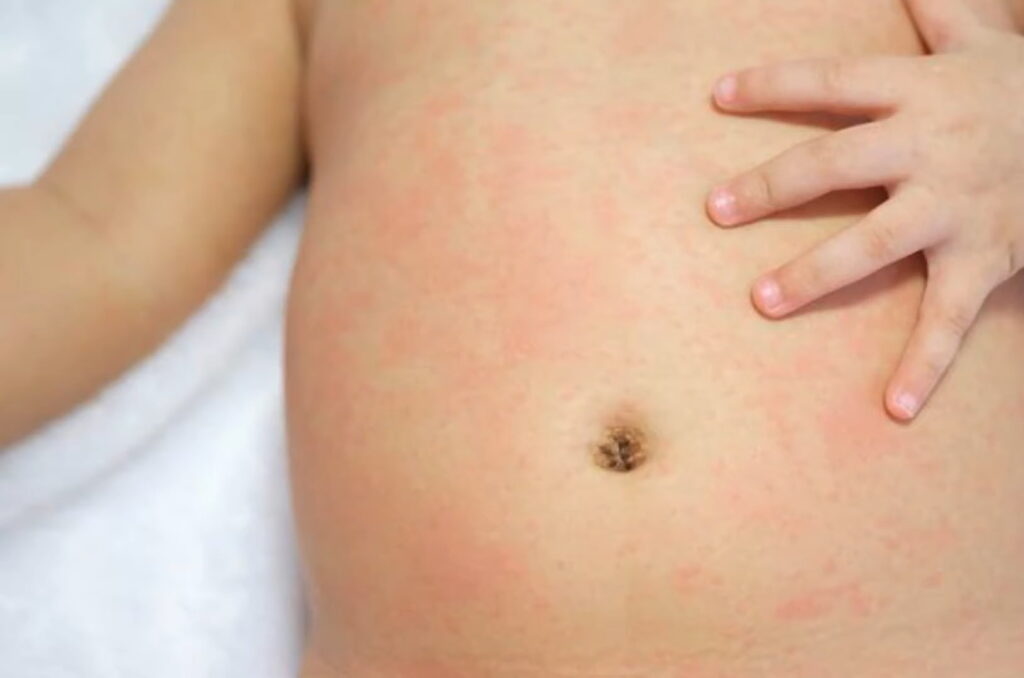
When it comes to diagnosing food allergies and intolerances in babies, healthcare professionals employ various methods to accurately identify the triggers. These diagnostic methods include:
1. Medical History: Gathering a comprehensive medical history is crucial in identifying potential food allergies or intolerances in babies. Parents or caregivers are often asked to provide detailed information about the baby’s symptoms when they occur, and what foods or drinks were consumed before.
2. Allergy Testing: Allergy testing plays a vital role in identifying food allergies. The two most common types of allergy tests are skin prick tests and blood tests. Skin prick tests involve pricking the skin with a small amount of the suspected allergenic food or its extract, while blood tests measure the levels of specific antibodies in the blood.
3. Elimination Diet: For diagnosing food intolerances, healthcare professionals often recommend an elimination diet. This involves removing certain foods from the baby’s diet and gradually reintroducing them to identify any adverse reactions or symptoms.
4. Food Diary: Keeping a food diary can significantly aid in identifying food allergies or intolerances. By recording the baby’s food intake and any symptoms experienced, patterns or triggers can be identified. By understanding the distinctions between food allergy and food intolerance and utilizing appropriate diagnostic methods, parents and caregivers can gain valuable insights into their baby’s dietary needs and ensure their overall health and well-being.
Allergy Testing For Babies

Discovering if your baby has a food allergy is crucial for their health and well-being. Allergy testing for babies provides valuable insights into potential allergens and helps parents make informed decisions about their baby’s diet.
Allergy Testing for Babies When it comes to managing a baby’s food allergies, allergy testing plays a crucial role in determining what foods to avoid. Understanding when to consider allergy testing, the types of tests available for infants, and their limitations and accuracy is essential for parents seeking relief for their little ones.
When To Consider Allergy Testing
If you suspect that your baby may have a food allergy, it is important to consult with their pediatrician. Typically, allergy testing for babies is considered when they exhibit persistent symptoms such as: 1. Frequent digestive issues: If your baby experiences recurring symptoms like vomiting, diarrhea, or constipation after consuming certain foods, it may indicate a food allergy. 2. Skin reactions: Allergic reactions can manifest as rashes, hives, or eczema. If your baby showcases these symptoms after eating particular foods, allergy testing is recommended. 3. Respiratory distress: Wheezing, coughing, or difficulty breathing after eating a specific food can be signs of a food allergy. It is crucial to address these symptoms promptly to avoid potentially serious complications.
Limitations And Accuracy Of Allergy Testing In Babies
It is important to note that while allergy testing can provide valuable insights, it is not foolproof. It may produce false positive or false negative results, leading to potential misunderstandings. Factors that can affect the accuracy of allergy testing in babies include
1. Age-related immune system development: Babies younger than six months may show false-negative results due to their immature immune systems. Allergy testing in infants is more accurate as they grow older.
2. Prior exposure to allergens: For accurate results, the baby must been exposed to the allergen in question. If a specific food has not been introduced to the baby, the tests may yield false negatives.
3. Interpretation of results: Proper interpretation of allergy test results is vital. It is best to consult with a pediatrician or allergist who specializes in pediatric allergies to obtain an accurate diagnosis. In conclusion, when considering allergy testing for babies, it is essential to pay close attention to their symptoms and consult with a healthcare professional. By understanding the different types of allergy tests available, parents can gain valuable insights into their baby’s food allergies. However, it is crucial to keep in mind the limitations and accuracy of these tests, ensuring proper interpretation of results for a more accurate diagnosis.
Potential Complications And Long-term Outlook
When it comes to food allergies in babies, potential complications and their long-term outlook can be a cause of concern for parents. Being aware of these complications and understanding the long-term outlook can help parents take necessary precautions and make well-informed decisions about their child’s health. In this section, we will discuss three key aspects related to potential complications and long-term outlook in the context of food allergies in babies: anaphylaxis and emergencies, the impact on the child’s growth and development, and the outlook for outgrowing food allergies.
Anaphylaxis And Emergency Situations
Anaphylaxis is a severe and potentially life-threatening allergic reaction that can occur in response to certain foods. It requires immediate medical attention. Signs of anaphylaxis may include difficulty breathing, swelling of the lips or throat, rapid heartbeat, dizziness, and loss of consciousness. If your baby experiences any of these symptoms after consuming a particular food, it is crucial to seek emergency medical care immediately.
Parents should always be prepared by having an emergency action plan in place. This plan should include clear instructions on how to administer any prescribed medication, such as epinephrine auto-injectors. It’s vital to know how to use the auto-injector properly and when it is necessary to administer it.
Remember, timeliness is crucial when it comes to anaphylaxis. The quicker the child receives appropriate medical treatment, the better their chances of a full recovery. Therefore, it is important to stay calm and act swiftly in an emergency situation.
Impact On Child’s Growth And Development
Food allergies can pose challenges to a child’s overall growth and development. In some cases, when certain foods are eliminated from a baby’s diet due to allergies, it may affect their nutritional intake and potentially lead to deficiencies. Nutrients such as calcium, iron, and vitamin D, which are commonly found in allergenic foods like milk, eggs, and fish, may need to be replaced through other sources.
Parents should consult with a pediatrician or a registered dietitian to ensure that their baby is receiving a well-balanced diet that meets their nutritional needs. Regular monitoring of growth and developmental milestones is also essential to identify any potential issues that may be linked to food allergies.
Outlook For Outgrowing Food Allergies
While food allergies can be challenging to manage, the good news is that many children outgrow them over time. The outlook for outgrowing food allergies varies depending on the type of allergy and individual circumstances.
Research suggests that children are more likely to outgrow allergies to milk, eggs, soy, and wheat compared to allergies to peanuts, tree nuts, fish, and shellfish. However, it is important to note that each child is unique, and it is difficult to predict the exact timeline for outgrowing any specific allergy.
Regular visits to an allergist can help assess the child’s progress and determine if food challenges or further testing is necessary to evaluate their tolerance to specific allergenic foods. It is crucial to remember that reintroducing allergenic foods without medical supervision can be dangerous and potentially trigger severe reactions.
While the journey of managing food allergies in babies can be daunting, having the right knowledge and medical support can make a significant difference. By understanding the potential complications, being prepared for emergencies, monitoring growth and development, and staying optimistic about the outlook for outgrowing food allergies, parents can provide the best possible care for their little ones.
Support And Resources For Parents
Being a parent of a baby with food allergies can be overwhelming and challenging. However, knowing that you have support and access to reliable resources can make a significant difference in managing your child’s condition. Here are some valuable ways to find the support and resources you need:
Parent Support Groups And Online Communities
Connecting with parents who are facing similar challenges can provide a sense of belonging and assurance that you are not alone in this journey. Joining parent support groups and online communities dedicated to food allergies can be immensely helpful. These groups provide a platform to share your experiences, ask questions, and gather valuable insights from others who have been through similar situations.
Moreover, engaging with other parents can give you access to firsthand knowledge about managing food allergies, including tips and tricks for dealing with different situations. Support groups and online communities can also serve as a source of emotional support, enabling you to find comfort and empathy during difficult times.
Reliable Sources For Information And Updates On Food Allergies
Staying up-to-date with the latest information and updates on food allergies is crucial for effectively managing your baby’s condition. Several reliable sources provide accurate and comprehensive information on food allergies:
- Medical Websites: Websites of reputable medical organizations such as Mayo Clinic (www.mayoclinic.org) and the American Academy of Allergy, Asthma & Immunology (www.aaaai.org) offer in-depth and reliable information on various aspects of food allergies.
- Research Journals: Exploring research journals, such as the Journal of Allergy and Clinical Immunology (www.jacionline.org), can provide you with scientific studies and findings related to food allergies, helping you better understand the condition.
- Food Allergy Organizations: Organizations specifically dedicated to food allergies, like Food Allergy Research & Education (www.foodallergy.org), offer comprehensive resources, educational materials, and updates on the latest research and treatments.
By accessing these reliable sources, you can ensure that you are equipped with accurate and evidence-based information to make informed decisions about your child’s dietary needs and overall well-being.
Educating Family, Friends, And Caretakers About Food Allergies
It is essential to educate your family, friends, and caretakers about your baby’s food allergies to create a safe and supportive environment. Here are some steps you can take to ensure their understanding:
- Communicate Clearly: Be open and honest about your baby’s food allergies, explaining the specific allergens and potential reactions. Emphasize the importance of strict avoidance and what to do in case of an allergic reaction.
- Provide Written Instructions: Prepare a written guide detailing your baby’s allergies, safe foods, and emergency contact information. This can serve as a quick reference for anyone responsible for your child’s care.
- Offer Resources: Share educational resources, such as brochures or websites, that provide information on food allergies. This empowers those around your baby to learn more and take necessary precautions.
By effectively educating your loved ones and caregivers about your baby’s food allergies, you can create a supportive network that prioritizes your child’s safety and well-being.

Frequently Asked Questions Of How To Know If Baby Has Food Allergy
How Do I Know If My Baby Has A Food Allergy?
Food allergies in babies can be identified through symptoms such as rash, vomiting, or difficulty breathing after consuming certain foods.
What Are The Common Signs Of Food Allergy In Babies?
Symptoms of food allergies in babies include eczema, hives, swelling, diarrhea, and excessive crying or fussiness.
At What Age Do Food Allergies Typically Appear In Babies?
Food allergies can emerge in babies as early as 4-6 months when solid foods are introduced into their diet.
Can Breastfed Babies Have Food Allergies?
Yes, breastfed babies can develop food allergies as they can react to proteins from the foods their mothers eat.
What Are The Most Common Food Allergens For Babies?
The most common food allergens for babies are cow’s milk, eggs, peanuts, tree nuts, soy, wheat, fish, and shellfish.
Conclusion
Being vigilant about recognizing the signs of a food allergy in your baby is crucial for their well-being. By paying attention to their reactions, such as rashes, digestive issues, or difficulty breathing, you can take the necessary steps to address any potential allergies.
Always consult with a healthcare professional to get a proper diagnosis and guidance on managing your baby’s food allergies. Your baby’s health and happiness depend on it.

